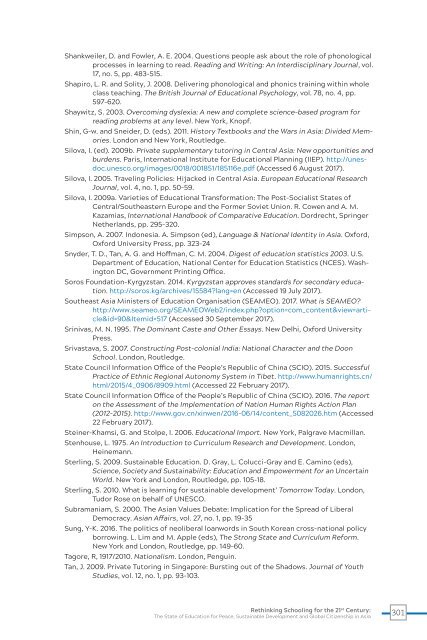Rethinking Schooling for the 21st Century
UNESCO MGIEP officially launched 'Rethinking Schooling for the 21st Century: The State of Education, Peace and Sustainable Development and Global Citizenship' in 2017 at the UNESCO General Conference. This study analyses how far the ideals of SDG 4.7 are embodied in policies and curricula across 22 Asian countries and establishes benchmarks against which future progress can be assessed. It also argues forcefully that we must redefine the purposes of schooling, addressing the fundamental challenges to efforts to promote peace, sustainability and global citizenship through education.
UNESCO MGIEP officially launched 'Rethinking Schooling for the 21st Century: The State of Education, Peace and Sustainable Development and Global Citizenship' in 2017 at the UNESCO General Conference. This study analyses how far the ideals of SDG 4.7 are embodied in policies and curricula across 22 Asian countries and establishes benchmarks against which future progress can be assessed. It also argues forcefully that we must redefine the purposes of schooling, addressing the fundamental challenges to efforts to promote peace, sustainability and global citizenship through education.
You also want an ePaper? Increase the reach of your titles
YUMPU automatically turns print PDFs into web optimized ePapers that Google loves.
Shankweiler, D. and Fowler, A. E. 2004. Questions people ask about <strong>the</strong> role of phonological<br />
processes in learning to read. Reading and Writing: An Interdisciplinary Journal, vol.<br />
17, no. 5, pp. 483-515.<br />
Shapiro, L. R. and Solity, J. 2008. Delivering phonological and phonics training within whole<br />
class teaching. The British Journal of Educational Psychology, vol. 78, no. 4, pp.<br />
597-620.<br />
Shaywitz, S. 2003. Overcoming dyslexia: A new and complete science-based program <strong>for</strong><br />
reading problems at any level. New York, Knopf.<br />
Shin, G-w. and Sneider, D. (eds). 2011. History Textbooks and <strong>the</strong> Wars in Asia: Divided Memories.<br />
London and New York, Routledge.<br />
Silova, I. (ed). 2009b. Private supplementary tutoring in Central Asia: New opportunities and<br />
burdens. Paris, International Institute <strong>for</strong> Educational Planning (IIEP). http://unesdoc.unesco.org/images/0018/001851/185116e.pdf<br />
(Accessed 6 August 2017).<br />
Silova, I. 2005. Traveling Policies: Hijacked in Central Asia. European Educational Research<br />
Journal, vol. 4, no. 1, pp. 50-59.<br />
Silova, I. 2009a. Varieties of Educational Trans<strong>for</strong>mation: The Post-Socialist States of<br />
Central/Sou<strong>the</strong>astern Europe and <strong>the</strong> Former Soviet Union. R. Cowen and A. M.<br />
Kazamias, International Handbook of Comparative Education. Dordrecht, Springer<br />
Ne<strong>the</strong>rlands, pp. 295-320.<br />
Simpson, A. 2007. Indonesia. A. Simpson (ed), Language & National Identity in Asia. Ox<strong>for</strong>d,<br />
Ox<strong>for</strong>d University Press, pp. 323-24<br />
Snyder, T. D., Tan, A. G. and Hoffman, C. M. 2004. Digest of education statistics 2003. U.S.<br />
Department of Education, National Center <strong>for</strong> Education Statistics (NCES). Washington<br />
DC, Government Printing Office.<br />
Soros Foundation-Kyrgyzstan. 2014. Kyrgyzstan approves standards <strong>for</strong> secondary education.<br />
http://soros.kg/archives/15584?lang=en (Accessed 19 July 2017).<br />
Sou<strong>the</strong>ast Asia Ministers of Education Organisation (SEAMEO). 2017. What is SEAMEO?<br />
http://www.seameo.org/SEAMEOWeb2/index.php?option=com_content&view=article&id=90&Itemid=517<br />
(Accessed 30 September 2017).<br />
Srinivas, M. N. 1995. The Dominant Caste and O<strong>the</strong>r Essays. New Delhi, Ox<strong>for</strong>d University<br />
Press.<br />
Srivastava, S. 2007. Constructing Post-colonial India: National Character and <strong>the</strong> Doon<br />
School. London, Routledge.<br />
State Council In<strong>for</strong>mation Office of <strong>the</strong> People’s Republic of China (SCIO). 2015. Successful<br />
Practice of Ethnic Regional Autonomy System in Tibet. http://www.humanrights.cn/<br />
html/2015/4_0906/8909.html (Accessed 22 February 2017).<br />
State Council In<strong>for</strong>mation Office of <strong>the</strong> People’s Republic of China (SCIO). 2016. The report<br />
on <strong>the</strong> Assessment of <strong>the</strong> Implementation of Nation Human Rights Action Plan<br />
(2012-2015). http://www.gov.cn/xinwen/2016-06/14/content_5082026.htm (Accessed<br />
22 February 2017).<br />
Steiner-Khamsi, G. and Stolpe, I. 2006. Educational Import. New York, Palgrave Macmillan.<br />
Stenhouse, L. 1975. An Introduction to Curriculum Research and Development. London,<br />
Heinemann.<br />
Sterling, S. 2009. Sustainable Education. D. Gray, L. Colucci-Gray and E. Camino (eds),<br />
Science, Society and Sustainability: Education and Empowerment <strong>for</strong> an Uncertain<br />
World. New York and London, Routledge, pp. 105-18.<br />
Sterling, S. 2010. What is learning <strong>for</strong> sustainable development’ Tomorrow Today. London,<br />
Tudor Rose on behalf of UNESCO.<br />
Subramaniam, S. 2000. The Asian Values Debate: Implication <strong>for</strong> <strong>the</strong> Spread of Liberal<br />
Democracy. Asian Affairs, vol. 27, no. 1, pp. 19-35<br />
Sung, Y-K. 2016. The politics of neoliberal loanwords in South Korean cross-national policy<br />
borrowing. L. Lim and M. Apple (eds), The Strong State and Curriculum Re<strong>for</strong>m.<br />
New York and London, Routledge, pp. 149-60.<br />
Tagore, R, 1917/2010. Nationalism. London, Penguin.<br />
Tan, J. 2009. Private Tutoring in Singapore: Bursting out of <strong>the</strong> Shadows. Journal of Youth<br />
Studies, vol. 12, no. 1, pp. 93-103.<br />
<strong>Rethinking</strong> <strong>Schooling</strong> <strong>for</strong> <strong>the</strong> 21 st <strong>Century</strong>:<br />
The State of Education <strong>for</strong> Peace, Sustainable Development and Global Citizenship in Asia<br />
301

















